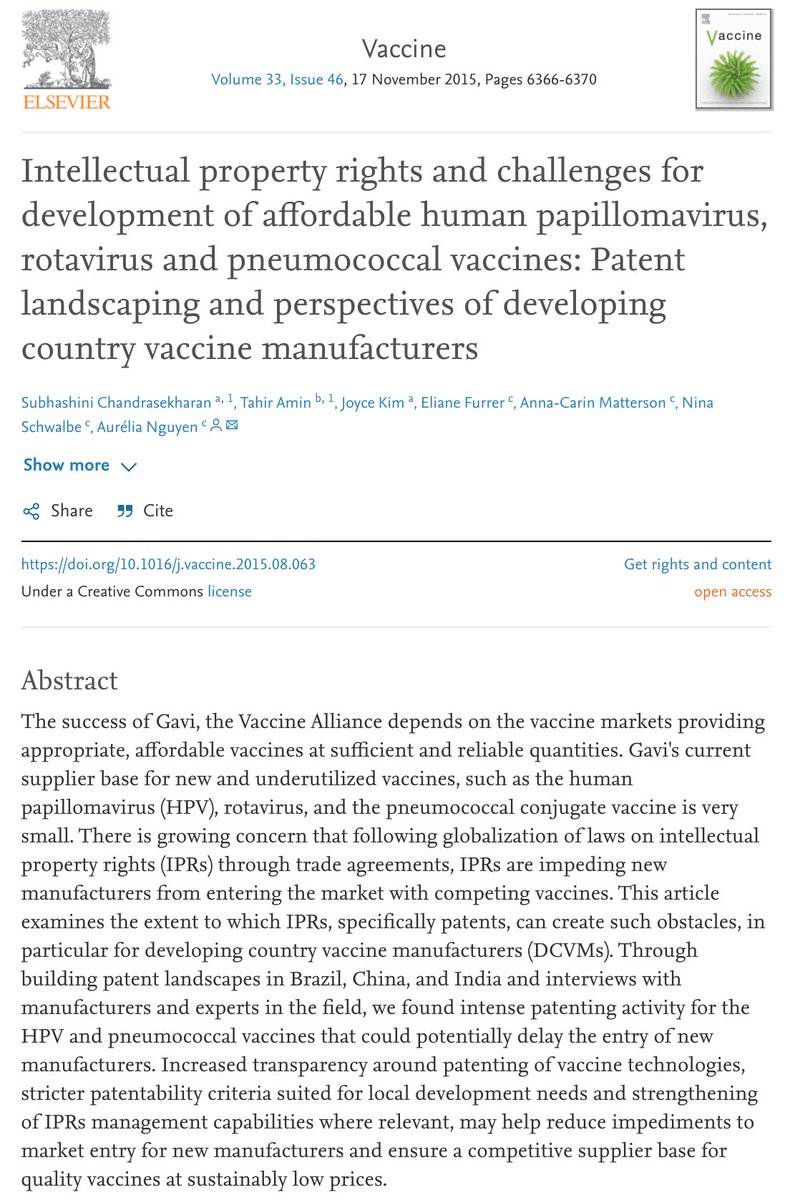That sentence is:
"It’s not clear developing countries even have the ability to manufacture large-scale, complex technologies like Moderna’s mRNA vaccine or Eli Lilly’s monoclonal antibody cocktail—let alone distribute them."
"It’s not clear developing countries even have the ability to manufacture large-scale, complex technologies like Moderna’s mRNA vaccine or Eli Lilly’s monoclonal antibody cocktail—let alone distribute them."
Putting aside the @WSJ& #39;s superiority complex, it& #39;s worth looking at some examples in the past where similar statements made by those in the western hemisphere about the scientific/technological abilities of countries in the global south have been proven wrong.
Case 1: In the 80s Merck and GSK had developed recombinant vaccines and held a monopoly with over 90 patents covering manufacturing processes. @WHO recommended every child be vaccinated but at $US23 a dose most Indian families could not afford.
Step in Shantha Biotechnics (later acquired by Sanofi). When the founder of Shantha approached a western firm for tech transfer, he was told: "even if you can afford to buy the technology your scientists cannot understand recombinant technology in the least".
Shantha went on to produce India& #39;s first home-grown recombinant product at $1 a dose. The vaccine was produced in a yeast system, the first of its kind for a commercial product, and different from that used in Merck and GSK& #39;s vaccines. https://bit.ly/3l6VFZD ">https://bit.ly/3l6VFZD&q...
Because of the $1 dose price, it enabled the low-cost mass vaccination through organisations such as UNICEF.
Case 2: When the avian flu crisis hit, Gilead/Roche drug Tamiflu was pushed as the first line treatment (later revealed to not be effective). Roche said it would be difficult for generic companies in India and the global south to synthesise the drug because of all the steps.
The @WSJ ran this back story in 2005 using language which questioned the claims of generic companies in the global south (nothing changes). I lived in India at the time and saw a Indian companies develop generic stockpiles of Tamiflu within months. https://on.wsj.com/39boKAK ">https://on.wsj.com/39boKAK&q...
Case 3: more recently with remdesivir, @GileadSciences said the the production is both resource and time intensive with some manufacturing steps taking weeks to complete. By July Hetero and Cipla were ready to dispatch generic versions https://bit.ly/3395Oi2 ">https://bit.ly/3395Oi2&q...
Having studied vaccine manufacturing capabilities in the global south on behalf of @GAVI, contrary to earlier research and beliefs, what we found was IP issues, including patents, can be a barrier to preventing cheaper vaccines in the market place. https://bit.ly/3fpKdab ">https://bit.ly/3fpKdab&q...
But the @WSJ is not concerned about the lives of people in these "poorer" countries, but more about maintaining a proprietary knowledge system that creates comparative advantage for a few countries.

 Read on Twitter
Read on Twitter



